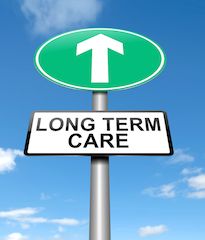BOSTON – Nearly two-thirds of affluent Boomers view long-term care as a potential risk to well-being in retirement, more than any other physical or financial risk identified, yet only 3 in 10 have actually made a plan to address the issue according to a recent survey conducted for John Hancock Insurance.
However, the survey also reports more than half (54%) of Boomers without a plan for long-term care expressed an interest in talking to an advisor about it and about 4 in 10 without long-term care coverage say they’re likely to buy some in the future.
“The need for long-term care continues to pose a significant, largely unprotected, financial risk for Americans, especially generations nearer to retirement,” said Michael Doughty, president, John Hancock Insurance. “The good news is that there appears to be some appetite for talking to an advisor and closing the coverage gap. By understanding where Boomers currently are in preparing for the future and getting a picture of how they might be approached, we may be able to help them alleviate some of their most significant concerns around retirement.”
Who are the Affluent Boomers?
The survey shows Boomers are generally lagging in overall retirement planning, don’t know that much about long-term care, and many don’t think they will need it. Having experience with long-term care does improve their knowledge and makes them more likely to think they may need long-term care in the future.
- Overall, the survey found Boomers generally lacking in financial planning and in knowledge about long-term care. Only half of all Boomers, and just 44% of pre-retiree Boomers, have developed a formal financial or retirement plan. Interestingly, those with advisors are more than twice as likely as those without to have a formal financial or retirement plan (62% vs. 26% respectively).
- The survey also showed that Boomers have relatively sub-par knowledge about long-term care. When asked 11 quiz questions about the issue, the average respondent answers just 7 of them correctly. They are least familiar with the cost and average length of stay in a nursing home as well as the likelihood of needing long-term care at an early age.
- Not surprisingly, those who have seen family or friends receive care score higher on the LTC quiz, suggesting that often knowledge of long-term care comes from experience. Currently 4 in 10 Boomers have had some experience with a family member or friend needing long-term care services for three or more months. The recipient is most often a parent or in-law, and in half of the instances, the respondent played the role of caregiver.
- Although two-thirds of respondents recognize the potential for needing long-term care in the future, many do not think they themselves are likely to ever need care. People are more likely to acknowledge that they might need care themselves when they have seen others receiving care, or when they have acted as a caregiver to someone else.
They are open to talking about and protecting the risk
While a majority of Boomers who haven’t planned are interested in talking to an advisor about the issue, they would like the advisor to bring the subject up. Two-thirds (67%) of respondents think it is important that their advisor initiate a conversation about long-term care issues and suggest possible solutions, with nearly a quarter (24%) saying it would be very important.
When asked about possible solutions to pay for long-term care, survey respondents said purchasing insurance is the most preferred way of handling long-term care costs (41%), although slightly more than a quarter (27%) of Boomers would prefer to simply pay out of pocket. Eleven percent said they’d purchase a long-term care rider on a life insurance policy; 8% said they’d have family members provide their care and 7% said they’d spend down assets to qualify for Medicaid and enter a Medicaid-approved facility.
“With the gap in LTC coverage that exists and with Baby Boomers being open to getting advice, there appears to be a clear opportunity for financial advisors to help Boomers better understand their LTC needs,” said Doughty.
See also:
- Candidates called on to address pending tsunami of care needs as LTCI Awareness Month approaches
- LTC Awareness Month: 8 things people should know
Methodology
The nationwide survey was conducted online by Greenwald & Associates on behalf of John Hancock Insurance. Interviews were completed in February 2015 among 1,003 adults between the ages of 50 and 68. Respondents were required to be either currently employed or retired with those working having household incomes of at least $100,000 and assets of at least $150,000 and those retired with investable assets of at least $500,000. The data are weighted by income and education to reflect the total population of affluent Boomers.
About John Hancock Financial and Manulife
John Hancock Financial is a division of Manulife, a leading Canada-based financial services group with principal operations in Asia, Canada and the United States. Operating as Manulife in Canada and Asia, and primarily as John Hancock in the United States, the group of companies offers clients a diverse range of financial protection products and wealth management services through its extensive network of employees, agents and distribution partners. Assets under management and administration by Manulife and its subsidiaries were C$883 billion (US$708 billion) as at June 30, 2015. Manulife Financial Corporation trades as ‘MFC’ on the TSX, NYSE and PSE, and under ‘945’ on the SEHK. Manulife can be found on the Internet at manulife.com.
The John Hancock unit, through its insurance companies, comprises one of the largest life insurers in the United States. John Hancock offers and administers a broad range of financial products, including life insurance, annuities,investments, 401(k) plans, long-term care insurance, college savings, and other forms of business insurance. Additional information about John Hancock may be found at johnhancock.com.
Long-term care insurance is underwritten by John Hancock Life Insurance Company (U.S.A.), Boston, MA 02117 (not licensed in New York) and in New York by John Hancock Life & Health Insurance Company, Boston, MA 02117.












